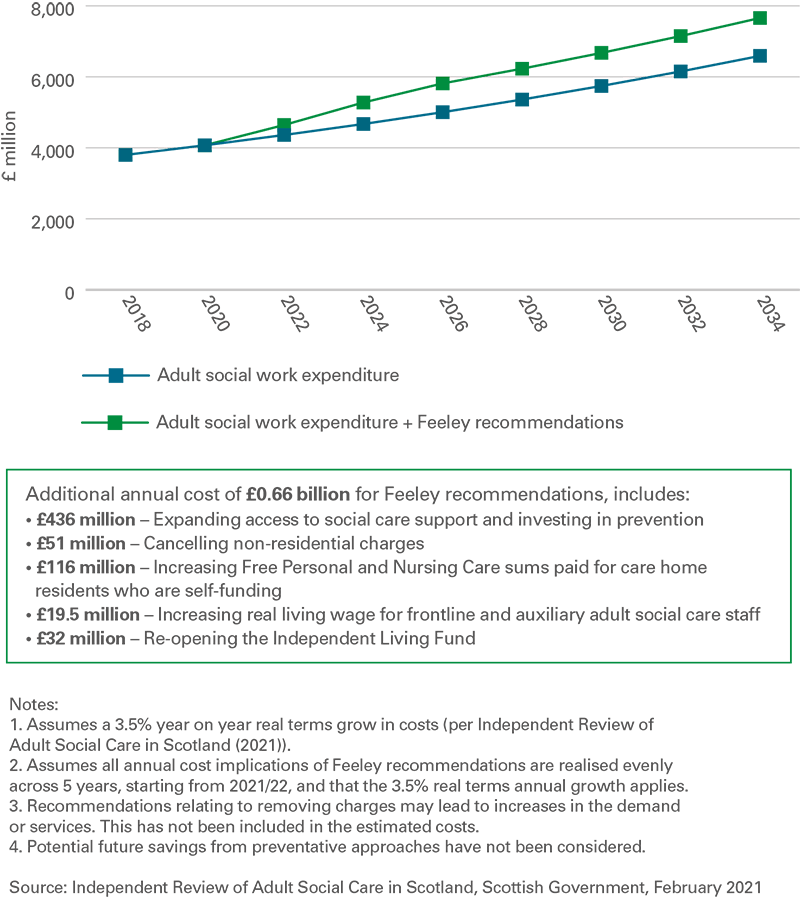Publication: Social care
by Auditor General, Accounts Commission
Social care reform questions remain
by Antony Clark, Interim Controller of Audit, and Interim Director of Performance Audit and Best Value

Changes to how social care is provided in Scotland are needed – but the solutions are far from simple.
The Scottish Government has committed to putting in place the recommendations of the Feeley report, including creating a National Care Service on par with the NHS that will change how care is managed, structured, and reported on.
But it’s not clear what that would look like. And the solutions to the challenges facing social care go far beyond new structures.
Feeley and other recent reports are broadly agreed: the current approach to providing social care support in Scotland needs to change, and the pandemic has made existing issues worse.
As more people are living with complex health and care needs and the population gets older, not everyone is receiving the support they need. Demand for care at home and giving people more choice and control over their own lives is also rising.
But the new models of care required to tackle these trends - involving the public, private and third sectors - will cost more money and it's not clear how they will be funded.
There are other barriers too. The integration of health and social care – initiated in 2016 by the Scottish Government – has moved too slowly. Integration Authorities were introduced to bring councils and NHS boards closer together to improve the lives of our most vulnerable. But this has been challenging in practice.
Councils and service providers also face difficulties in recruiting staff due to low pay, antisocial hours, and difficult working conditions. The Scottish Government and COSLA are committed to ensuring adult social care workers receive at least the Real Living Wage of £9.50 an hour - an important step forward. But the latest figures show gaps in skills across the care sector and over a third of services with vacancies.
And of course, most care and support is provided by unpaid carers. There are an estimated 700,000 unpaid carers in Scotland compared to around 125,000 workers in care at home, housing support and care homes.
Feeley sees overall responsibility for social care moving to Scottish Ministers with funding going straight to Integration Authorities to plan, commission and procure services directly, rather than via councils and health boards. Other key organisations, such as the Care Inspectorate and Scottish Social Services Council, would see changes in roles and report to a national board. There is a consensus among all political parties on the case for change set out by Feeley, but major sticking points are the extent of structural changes required and where responsibility lies.
This will take time, and new legislation, and lessons must be learned from the introduction of Integration Authorities, as set out in our 2018 report. The focus on improving lives can’t be lost amid structural changes.
To do all this, more investment is needed on top of almost £4 billion already spent each year on paid adult social care. Spending is forecast to increase by 3.5 per cent a year up to 2035 – a 73 per cent or £2.8 billion increase. Applying Feeley’s recommendations adds at least another £0.66 billion a year – around 0.4 per cent of Scotland's GDP (see chart and text box below).
Funding options put forward by Feeley include a new mandatory social insurance and changes to devolved and reserved taxation, including the introduction of new taxes.
More detailed work and engagement is required by the Scottish Government on understanding demand and the cost of providing new models of care and how it will be funded. A clear plan and timescales are also needed quickly.

Additional annual cost of £0.66 billion for Feeley recommendations, includes:
- £436 million – Expanding access to social care support and investing in prevention
- £51 million – Cancelling non-residential charges
- £116 million – Increasing Free Personal and Nursing Care sums paid for care home residents who are self-funding
- £19.5 million – Increasing real living wage for frontline and auxiliary adult social care staff
- £32 million – Re-opening the Independent Living Fund
Notes:
- Assumes a 3.5% year on year real terms grow in costs (per Independent Review of Adult Social Care in Scotland (2021)).
- Assumes all annual cost implications of Feeley recommendations are realised evenly across 5 years, starting from 2021/22, and that the 3.5% real terms annual growth applies.
- Recommendations relating to removing charges may lead to increases in the demand or services. This has not been included in the estimated costs.
- Potential future savings from preventative approaches have not been considered.
Source: Independent Review of Adult Social Care in Scotland, Scottish Government, February 2021
Social care continues to be an area of interest for us, and we will publish a briefing paper setting out in more detail the challenges and risks of the new models being proposed. From 2022, we plan to take a more focused look at specific aspects of social care, for example the workforce or commissioning and procurement of social care support.
You can find more about our work on Transforming health and social care in Scotland here.




